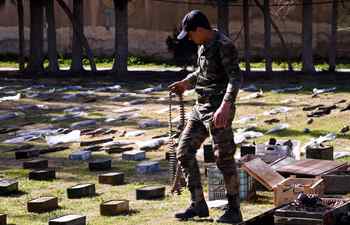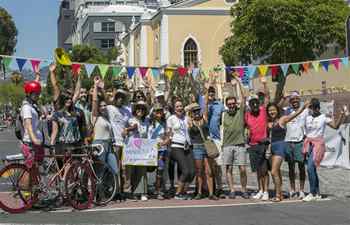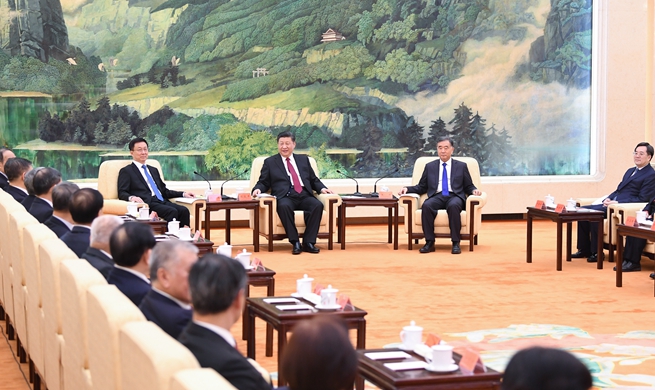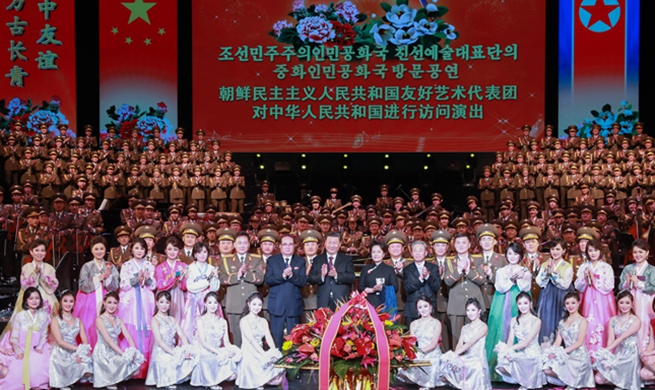GAZA, Jan. 28 (Xinhua) -- Palestinian President Mahmoud Abbas' Fatah movement has begun consultations with factions of Palestine Liberation Organization (PLO) to form a new government, a move Palestinian observers believe will further deepen the 11-year-old internal division.
On Sunday, Fatah Central Committee recommended the formation of a national unity government.
In a press statement following a meeting chaired by Abbas, the committee said the new unity government should comprise PLO political factions and independent figures to replace the current consensus government headed by Prime Minister Rami Hamdallah.
The Fatah Central Committee also recommended the formation of a committee that includes Fatah leaders to begin dialogue and consultations with PLO factions on the formation of the new government.
Fatah officials announced that the committee will not hold any discussions with Islamic Hamas movement, which rules the Gaza Strip, or the Islamic Jihad movement.
The current Palestinian consensus government was formed in mid-2014 in accordance to a reconciliation agreement reached in Gaza in the house of Hamas chief Ismail Haniyeh.
Meanwhile, Hamas criticized Fatah's attempts to create a new government, saying it comes with no "national consensus."
In an interview with Xinhua, Hamas Spokesman Fawzi Barhoum accused Fatah of evading its responsibilities of ending the internal division, stressing that it is necessary to form a national unity government of all political factions to prepare for the general elections.
Officials in the Popular Front and Democratic Front for the Liberation of Palestine, the two largest factions in the PLO after Fatah, announced their refusal to join the new government as it does not "enjoy national consensus."
"Fatah movement believes that forming a new government is an effective tool to restore its power in ruling in the West Bank," Ramallah-based political analyst and writer Jihad Harb told Xinhua.
Through the new factional government, Fatah want to face the consequences of the next stage, including the possibility of taking new measures against Hamas in the Gaza Strip, he added.
"Fatah sees that the current government did not deal properly with many files which led to difficult economic and social challenges," the expert said, adding that the formation of the new government will exacerbate the internal Palestinian division "which has already become enough."
In October 2017, Palestinian rival movements Fatah and Hamas signed a reconciliation deal in Cairo to end their long-time rift, agreeing on a complete handover of Hamas-ruled Gaza Strip to Fatah by Dec. 1 and to enable the consensus government under Fatah to have full control of the enclave.
However, the deal has not been implemented so far, and Hamas in the Gaza Strip and Fatah in the West Bank are trading accusations on who is responsible for the delay.
The Palestinian division began in June 2007 when Islamic Hamas movement forcibly seized control of the Gaza Strip, leaving Fatah party in control over only the West Bank.
Hani el-Masri, a Ramallah-based political analyst, said the approach of the Palestinian Authority and Fatah to form a new government comes after the reconciliation efforts reached a dead end.
"The government to be formed should assume the task of preparing for the legislative elections following the recent decision of the Supreme Constitutional Court to dissolve the current Hamas-dominated Legislative Council," he told Xinhua.
He added that the move to form a new government without consensus perpetuates "the failure of the Egyptian attempts to create a breakthrough in the reconciliation file to end the division."
Abbas announced on Dec. 22 last year that the Palestinian Constitutional Court issued a decision to dissolve the inoperative parliament, better known as the Palestinian
Legislative Council (PLC), and prepare for holding new parliamentary elections in the Palestinian territories within six months.
Hamas movement, which won the last parliamentary elections held in 2006, slammed the decision as a way to deepen the internal Palestinian division.
In the meantime, professor of political science at Al-Azhar University in Gaza Riyad al-Eila highlighted that the formation of the new government will be linked to the basic task of preparing for the holding of new parliamentary elections.
"It is too early to talk about the extent of participation in the new government or the extent of its support from the factions of the PLO," he said, adding that the upcoming official consultations will decide who is going to join the new government.
He also said the general trend is to elect a parliament as "a translation of a new transitional phase that would effectively put previous Palestinian decisions into actions in order to transform from the stage of an authority to the stage of a state."

















